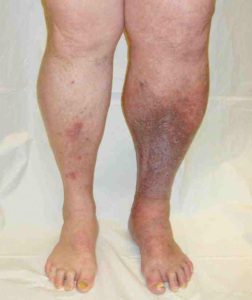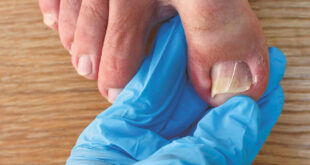By Federico M. Richter, MD
 Have you noticed that your legs feel heavy, achy, or seem swollen? Various forms of venous issues affect 25 million Americans. When our veins are working properly, they pump blood back to the heart. Valves in the veins are made to open and close in one direction if these valves or the wall of the veins are damaged, the blood is unable to work against gravity, and the result is a pooling of the blood in our legs. This pooling is called stasis and can present significant risks to our health. Stasis is the main cause of venous reflux also known as venous insufficiency.
Have you noticed that your legs feel heavy, achy, or seem swollen? Various forms of venous issues affect 25 million Americans. When our veins are working properly, they pump blood back to the heart. Valves in the veins are made to open and close in one direction if these valves or the wall of the veins are damaged, the blood is unable to work against gravity, and the result is a pooling of the blood in our legs. This pooling is called stasis and can present significant risks to our health. Stasis is the main cause of venous reflux also known as venous insufficiency.
Sometimes venous reflux is more of a cosmetic issue and poses little health concern. This is usually noted in spider veins, which is when the tiny capillaries are damaged, but when the veins are damaged, this can cause varicose veins, which can lead to much more severe health issues. Neither of these should be taken lightly. A medical professional will be able to report whether or not your symptoms are superficial, or dangerous and in need treatment. If a person has chronic venous reflux, their heart will not receive the appropriate amount of blood due to the insufficient blood pumping from the legs.
Symptoms of Venous Reflux:
• Leg pain while standing or sitting, which subsides after resting for an extended period of time
• A sensation of tightness & burning may occur in the leg or foot
• Swelling of the calves, which dissipates after elevation
• Dark veins
• Dry, itchy skin
• Ulcers can occur near the ankle and are often painless, but may have a dark rim
Although venous reflux can happen to anyone, the most common factors that put you at risk for vein issues are family history, smoking, being overweight, and a sedentary lifestyle.
Treatment Options for Venous Reflux
• Compression Stockings
• Gradient Compression Devices
• Increased Exercise
• Medications
• Surgery (Usually through minimally invasive catheters, or ultrasound)
Because proper blood circulation aids the body’s flow of nutrients and oxygen to the heart, brain and other organs, it’s imperative to maintain and improve our arterial and venous blood flow as we age.
Maintaining Healthy Veins & Arteries
One of the ways to do this is by maintaining a healthy diet to keep lipid levels in proper balance. Antioxidant-rich foods support the vascular. A diet rich in vegetables, fruit and lean protein is typically recommended.
Another way to achieve healthy circulatory functioning is to exercise. Along with resistance training, any form of cardiovascular activity will improve blood flow and circulation. Getting the heart rate up increases blood volume, allowing the oxygen-rich blood to move more efficiently through the circulatory system. Always remember to speak to your physician before starting any new diet or exercise program.
Because the veins and arteries balance each other out, when a person experiences chronic venous reflux it’s critical to see a physician. If the veins are damaged, it’s not unusual that the arteries are not pumping blood efficiently either. Chronic venous insufficiency must be treated to prevent further damage to your circulatory system and your overall health. If you or someone you love is experiencing any venous issues, please contact your physician immediately.
About Federico M. Richter, MD
Dr. Richter focuses on the newest developments in minimally invasive vein treatments. Dr. Richter received his medical degree in Argentina in 2003 from Universidad Nacional de Cordoba . He then completed a year of general surgery and a 3-year Fellowship in vein and lymphatic disorders in 2007. As a venous and lymphatic medicine specialist, he is dedicated to treating varicose and spider veins and their underlying causes.
With over a decade of experience in the specialized medical field of diagnosing and treating vein disease, Dr. Richter was one of the first doctors to use lasers to treat a variety of vein diseases in Argentina. Certified by the American Board of Venous and Lymphatic Medicine and an active member of the American College Of Phlebology , Dr. Richter has also accumulated an impressive list of qualifications and educational accomplishments during the course of his career.
To schedule a consultation, call Vein Centers at Erasers 941-907-3400
or visit
6050 53rd Ave. East (SR70), Suite A, Bradenton, FL 34203
 Southwest Florida's Health and Wellness Magazine Health and Wellness Articles
Southwest Florida's Health and Wellness Magazine Health and Wellness Articles

